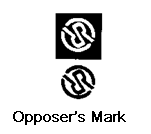
July/August 2010 Issue
TTAB Cases
Flash & Partners S.P.A. v. I.E. Mfg. LLC,
Opp. No. 91191988 (TTAB July 14, 2010)
ABSTRACT
Opposer’s motion to dismiss Applicant’s counterclaim for cancellation was granted with respect to Applicant’s allegations based on ex parte examination matters. Specifically, the TTAB dismissed Applicant’s assertions that Opposer’s submission of an unsigned declaration and filing of amended drawings before declaring a bona fide intent to use the mark constituted grounds for cancellation. However, the TTAB denied Opposer’s motion to dismiss with respect to Applicant’s allegations that assignments of Opposer’s underlying application were invalid.
CASE SUMMARY
FACTS
I.E. Manufacturing LLC (“Applicant”) applied to register the mark shown below for “eyewear; sunglasses; goggles for sports; eyewear cases, namely, cases for sports eyewear.” Flash & Partners S.P.A. (“Opposer”) opposed the registration on the grounds of priority and likelihood of confusion. Applicant filed a counterclaim for cancellation of Opposer’s pleaded registration, shown below. Opposer moved to dismiss the counterclaim and, in its response to this motion, Applicant moved to amend its counterclaim.


ANALYSIS
The TTAB held that to withstand Opposer’s motion to dismiss, Applicant must demonstrate
(1) standing to challenge the continued registration of Opposer’s mark, and (2) a valid statutory ground for cancellation. The TTAB addressed Applicant’s asserted grounds for cancellation of Opposer’s registration separately.
First, Applicant sought cancellation of Opposer’s pleaded registration on the ground that the underlying application was incomplete. Specifically, Applicant claimed that Opposer failed to submit a signed declaration supporting the application, thus rendering the registration void ab initio. The TTAB rejected this argument, finding that the submission of an unsigned application is an ex parte examination matter that does not form a statutory ground for cancellation. Further, the TTAB noted that the deficiency had been rectified with a verified statement submitted during examination.
Similarly, the TTAB rejected Applicant’s related allegation that Opposer’s predecessor lacked a bona fide intent to use the mark as originally filed. Applicant alleged that the predecessor’s filing of a pre-examination amendment to the drawing before filing a declaration attesting to its bona fide intent constituted grounds for cancellation. The TTAB disagreed, confirming that an amended drawing need not be verified by a declaration, and that such a submission does not alone raise an issue of a lack of bona fide intent.
The TTAB expounded on its rejection, noting that any assertion by Applicant that Opposer’s amended mark was a material alteration likewise did not form a statutory ground for cancellation. Any rejection of the amendment as a material alteration by the Examining Attorney would have preserved Opposer’s original filing date for the original drawing and afforded Opposer opportunities to appeal or petition the refusal. The TTAB found that cancellation of the resulting registration in this proceeding “would, in effect, punish opposer for an alleged error on the part of the examining attorney.”
Second, Applicant counterclaimed for cancellation of Opposer’s pleaded registration on the ground that the underlying application was invalidly assigned. Namely, Applicant alleged that the application was twice assigned prior to the filing of a statement of use, and the assignments did not involve the transfer of an ongoing or existing business under the mark as of the execution date or the nunc pro tunc effective date. Applicant asserted that these assignments, therefore, were in violation of Section 10 of the Trademark Act, and, thus, the underlying application and any resulting registration is void.
The TTAB noted that under Trademark Act § 10, an application filed under § 1(b) may not be assigned before filing of either an amendment to allege use or statement of use, except to the successor of applicant’s business, or portion of the business to which the mark pertains, if that business is ongoing and existing. Further, the TTAB stated that an assignment of a § 1(b) application in violation of this rule renders the application and any resulting registration void.
In this case, the TTAB concluded that Applicant’s counterclaim contained sufficient allegations to set forth a claim that the assignments violated the provisions of Trademark Act § 10. Accordingly, the TTAB denied Opposer’s motion to dismiss the counterclaim as to this ground.
CONCLUSION
This decision represents one of few precedential decisions addressing grounds for opposition and cancellation based on an allegation of an invalid assignment in violation of Section 10 of the Trademark Act. It also emphasizes the TTAB’s strict adherence to the available statutory grounds for opposition and cancellation, and its consistent finding that ex parte examination matters do not form a valid ground for opposition or cancellation.